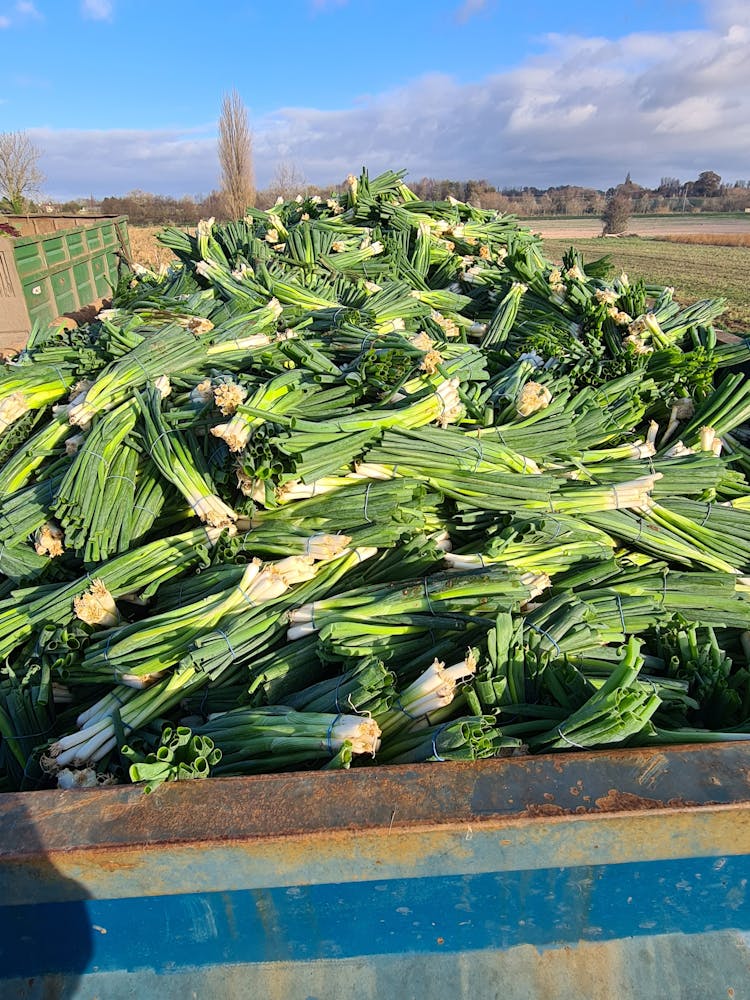Rescue Story: Showered with Spring Onions
It’s not too often we’re faced with such a large-scale rescue mission as the one we’re currently encountering.

Remember all those spring onions you unearthed from your box back in December? This current batch come from the very same grower in Egypt. The last lot became one of our biggest rescue missions to date, resulting in around 100,000 bunches saved from going to waste.
We recently had a chat with Jon Newell, Red Star Growers’ National Account Manager, who explained how ongoing bad weather has caused yet another hefty haul of unwanted spring onions to end up on our shores.
“The excess is mainly down to weather conditions; storms are particularly common in January and February. Some boats still come through on time, others are delayed.”
On average, it takes around 10 and 12 days for a container of spring onions to make the journey by boat from Egypt to the UK. Throw in some stormy weather and rough seas and this can quickly jump to 19 days.
A delay of a few days may not seem like a lot to us. To our grower, though, it can mean the difference between the spring onions ending up on supermarket shelves or on the compost heap.
Sticking to schedules
The process of harvesting, packing and shipping spring onions runs on a relatively tight timetable. While the growing season is planned out around six months in advance, Jon explains that supermarkets only place their orders six weeks before they need the product to arrive in the UK.
Approximately three containers of spring onions are usually ordered by the UK catering and hospitality industry a week. However, with many restaurants and entertainment venues forced to close at short notice due to staff members isolating with COVID-19, demand is now much lower than expected.
When boat space has already been allocated and supermarket shelves set aside, it’s crucial that everything runs smoothly and on schedule. As Jon so accurately puts it: “You can’t cancel an order once it’s already on its way.”
Braving the storms
Unfortunately, bad weather in both December and January has ended up playing havoc with Jon’s shipments. Many left Egypt’s ports later than scheduled, while others took longer to make the journey than expected because of rough seas and last-minute diversions. The result? Dozens of crates arriving on UK shores all within a few short days of each other.
Adding to the issue is the fact many of the pre-ordered spring onions have now missed their cut-off times to make it into supermarket programmes. Far less demand, paired with the fact that the same number of spring onions are arriving into the UK as originally planned, means our grower has a real problem on their hands.
Jon puts this all into perspective; “In the last 19 days, we’ve received 23 containers, but we’d have been happy to have 18.”
With at least five containers of spring onions to shift and few places for them to go, hundreds of thousands of bunches are at serious risk of going to waste.
Seeing all those spring onions being tossed away would have made us shed a few tears. As we’re able to store our regular UK onions, we’ve managed to make space and prioritise rescuing as many of Jon’s spring onions as we can.
Quality and quantity
One thing you might be wondering is how these shipping delays affect this versatile root vegetable’s quality.
Spring onions have a relatively short shelf life and can only really be stored for a maximum of a few weeks. Luckily, several days delay arriving from Egypt doesn’t make a huge amount of difference.
“Those that arrive within 10-12 days can be sold as they are,” says Jon. “Those that arrive after 16 or 17 days will need rehydrating and trimming."
Save our spring onions
Rescue operations like this really are at the root of what we do. Every single bunch of spring onions you unpack has been saved from going to waste and you can enjoy even more of these leafy beauties next week, too.
Not sure what to do with yours? Spring onions are a brilliant alternative to regular onions and you’ll spot plenty of mouth-watering dishes to add them to in our recipes section.

